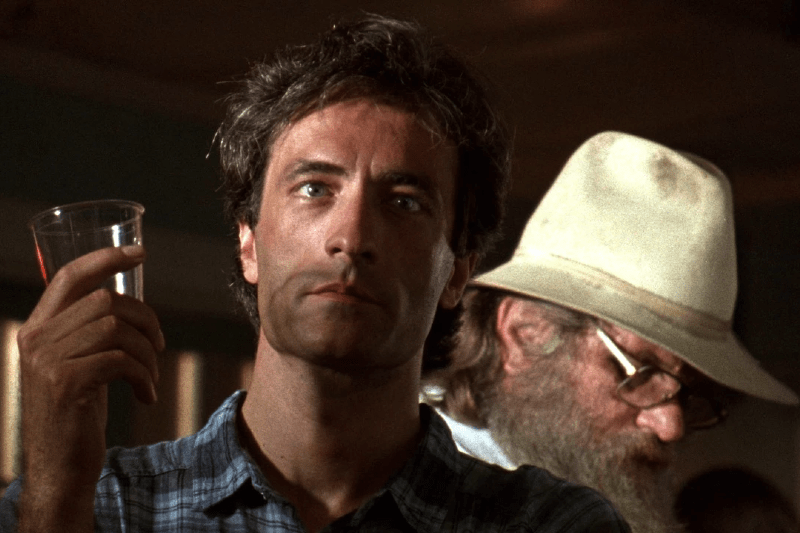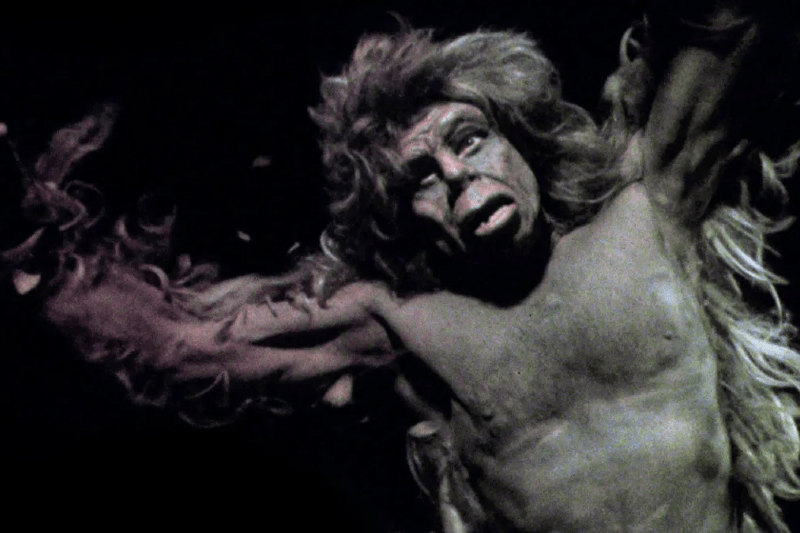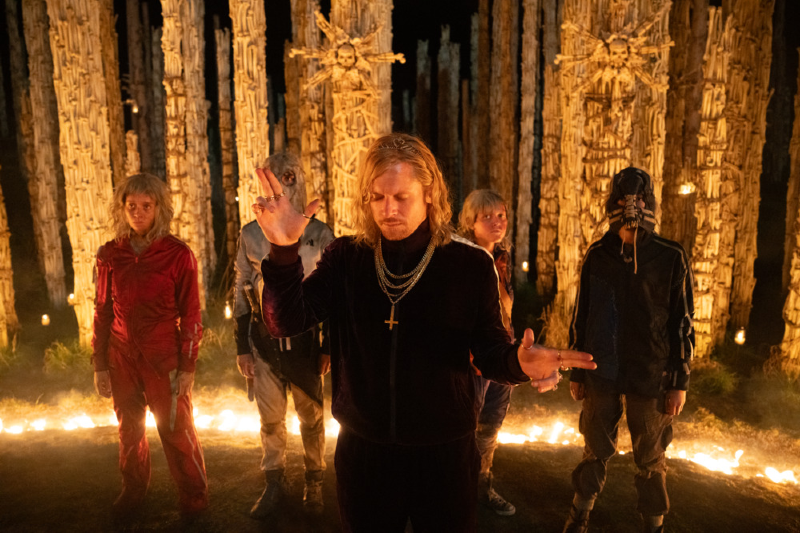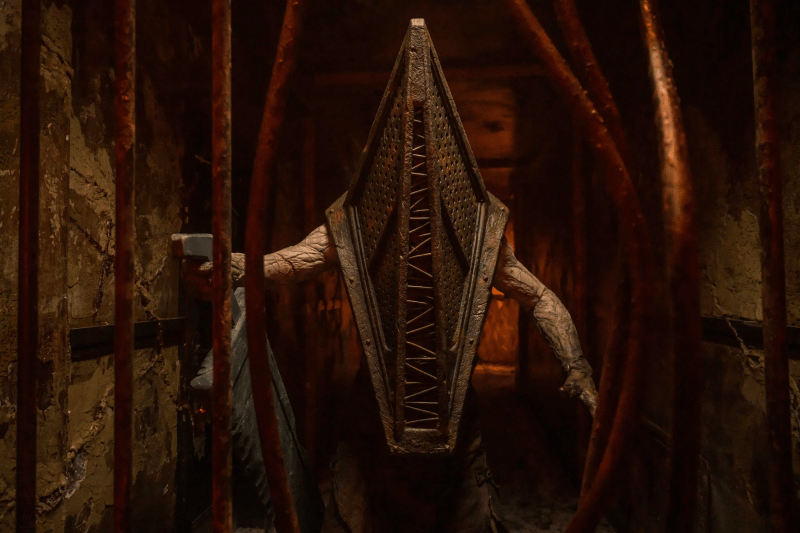Mary Shelley’s Frankenstein still inspires the imagination, with perfectly good reason. As though reaching through time, Shelley’s themes of life, death, nature, ambition, family, and alienation are ever-prescient. It is why we have many takes on the material, from faithful adaptations to loose reimaginings to merely Frankenstein-flavored fare. Like many creatives before and after him, Larry Fessenden used Frankenstein as a framework for his feature directorial debut in 1991. Not unlike its source of inspiration, No Telling is a film that lays bare contemporary anxieties such as imploding marriages, medical ethics, and ecological collapse.
No Telling is centered around Lillian Gaines (Miriam Healy-Louie), who relocates with her husband Geoffrey (Stephen Ramsey) to the countryside for the summer. Geoffrey is a scientific researcher searching for a way to transplant limbs. His attempts have been unsuccessful, but he still believes he is close to a breakthrough. This leads him to neglect Lillian, who desperately wants to start a family and have her husband invest in her in the way he does his work.
Geoffrey throws himself headlong into his grotesque experiments, killing many small lab animals in the process. Meanwhile, Lillian’s interest in her art is renewed, and she makes friends with local organic farmer—and eco-advocate—Alex Vine (David Van Tieghem). Lillian starts spending more time with Alex due to her husband’s obsessive work. Through Alex, she becomes acquainted with a sweet local farming family, the Boyds (Robert Brady and Susan Dee), and takes a liking to Boyds’ daughter Frances (Ashley Arcement) and her faithful dog Chester.
Writer and director Larry Fessenden and co-writer Beck Underwood set the stage for exploring scientific ethics and ecological pathos by using the Gaineses' crumbling marriage as a backdrop. It probably helps that creative collaborators Fessenden and Underwood are a real-life married couple. From the outset of No Telling, Geoffrey is more taken with his work than he is with his wife or the prospect of parenthood. The audience is introduced to a woman whose husband has successfully alienated himself from her with his desire for ambition and glory. Geoffrey’s dedication comes off less as passionate and admirable and more self-serving as the plot marches forward to a macabre climax.
Medical ethics are a huge sticking point for Fessenden and Underwood in the screenplay’s content. Some of the film’s most disturbing scenes are when Geoffrey conducts his experiments to create what he calls “chemo-electric therapy.” His work centered around amputations and limb grafts is utterly horrific. He goes about his work mutilating animals, throwing their freshly dead bodies in the trash. There are bunnies with spines exposed and rats with legs removed. The lab animals are all white, displaying how innocent they are in the face of this carnage.
The groundwork for Geoffrey’s monstrosity in No Telling is firmly laid, but his descent into metaphorical hell is more gruesome than even Lillian could have anticipated. He requests primate test subjects, but in his impatience, he starts using an old animal trap to ensnare larger and more complex animals for his experiments.
All the while, Lillian learns the surrounding farmlands have been polluted with pesticides, bringing the film’s next ethical quandary into play. There have been pervasive animal deaths and water pollution; as a result, the farmers are suffering. The dire nature of the pollution doesn’t stop the farmers from being preyed upon by unethical and capitalistic pesticide companies. As an activist, Vine has positioned himself within the community to aid the farmers—many of whom have developed cancer, a possible side effect of the dangerous pesticides.
These plot points speak to real-life issues plaguing rural communities. Companies still seek to sell unregulated pesticides that harm the lands and wildlife, essentially destroying the livelihood of rural communities and causing food shortage issues. Because of this, legislative protections have been put in place to better protect rural ecosystems, but money-hungry politicians and corporations constantly strive to overturn these protections, and the cycle continues all over again.
It’s not shocking that the theme of corporate greed also intersects with Geoffrey’s storyline in No Telling. Geoffrey is hell-bent on glory and dangles his revolutionary “chemo-electric therapy” as a cash cow in front of the pharmaceutical company funding his research. While medical science and innovation are great things, Geoffrey is pursuing them for the wrong reasons, and this further bankrupts his already slim morals, leading him to trap and experiment on Frances Boyd’s beloved dog Chester.
During an extremely tense dinner scene featuring Lillian, Geoffrey, and Alex, the two men argue about how the world should be run and society should progress. Both urge Lillian to side with the other without caring what Lillian thinks or has to say. The storm of the male ego becomes too much for Lillian, leading her to give one of the film’s most important speeches.
“I don’t know if that’s what I’m trying to say, but it doesn’t really matter. Does it? What I have to say? I guess it’s up to you two to come up with the future. I mean, this is the new ‘The White Man’s Burden.’ Instead of Christianizing a bunch of natives, now we’ve got the whole natural world to set in order. I mean, plotting for a better tomorrow? Isn’t that what they say affects pharmaceuticals? If only all the boys in lab coats could agree, we’d really know what the future will be.”
As Lillian points out, white cis straight men have appointed themselves as the stewards of the so-called “progress of humanity” and continually clash over ethical dilemmas. Few others are factored into this decision-making progress, leading to further gatekeeping and reductiveness. While the men are arguing, Lillian becomes a prize, someone to be swayed. At that moment, her beliefs and worldview matter little beyond the concept of agreement, the intersection of gender politics, capitalism, and ethics. Geoffrey’s ire makes Lillian’s point. Her feelings and opinions are null when it comes to matters of men, even on this small scale.
From test subjects to the Boys—and even to Lillian herself—living beings are shown as a means to an end for Geoffrey in No Telling. All of them have become fodder for exploitative measures. Geoffrey mutilates the test subject animals, whereas the Boyds are victims of pesticide companies that sell and are also monetarily manipulated by Geoffrey when he purchases a calf from them for his experience. Prideful pursuits in the strip beings—humans and animals—of their agency and importance, not unlike the capitalist paradigm that society is still subjected to. The end of the film makes this clear. The inherent worth of living beings means little to men whose hubristic hungers overtake any semblance of morality.
Lillian finally pieces together the seemingly disparate events of Geoffrey purchasing a calf from the Boyds and Chester going missing. She and Alex race back to the farm to find Geoffrey urging a disfigured Chester—who now has the calf’s legs attached to the lower half of his body—to walk as he videotapes it. Wires carrying electricity run to an apparatus protruding from Chester’s brain, exposing his spine. Lillian’s shock and disgust soon turn to anger as she and Geoffrey finally face off. She mournfully reminds him that Chester matters and that he belongs to a little girl. It is at this moment that the couple’s marriage finally ruptures. Geoffrey, riding high on his “accomplishments” and drunk on the liquor of toxic masculinity, insists that he is close to giving Lillian the life she wants. When Lillian protests, he tells her, “I know exactly what you want.” It is then that Lillian can break free from her marriage, knowing that her husband is irredeemable.
Like the audience of No Telling, Lillian tells Geoffrey he performed this aberration because he could. Geoffrey’s sadistic God complex has come to a head, and the results are sickening as a distraught Lillian and Alex attempt to comfort a dying Chester. Geoffrey’s selfish pursuits have fallout. Chester is dead; a little girl will have to deal with the dog’s death; Geoffrey’s marriage is over; and Alex and Lillian are left traumatized. Ultimately, the quest to alter life for personal gain and spit in the face of nature is for nothing. Chester dies, and Geoffrey blames Alex and Lillian, yet that does not stop him from calling his pharmaceutical financiers to tell them the good news as his wife flees him once and for all.
No Telling explores the gods and monsters concepts that are put forth in Mary Shelley’s masterwork, Frankenstein. Screenwriters Larry Fessenden and Beck Underwood’s understanding of the source material's themes led them to create one of the most pertinent examples of indie dramatic horror. The intersections of ethics, capitalism, rural disenfranchisement, and gender are dissected in novel ways, using a centuries-old premise to facilitate a tense commentary. It’s a worthy and cerebral film that asks no easy questions and provides complex answers. In this age of gods and monsters, Fessenden reminds us that all monsters are, in fact, human.







